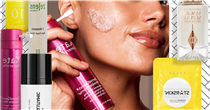From how it compares to hyaluronic acid to the best products available, here’s everything you need to know.
You will have no doubt heard of the skincare benefits of hyaluronic acid, but what about polyglutamic acid?
Polyglutamic acid is cropping up in more and more skincare launches, thanks to its ultra hydrating properties and is a handy skincare addition for those with dry or dehydrated skin.
Here, Dr Nyla Raja, medical director and founder of Medispa, London, Cheshire & Liverpool, runs through everything you need to know about the up and coming skincare ingredient.
You may also like
Shea butter for body: the nourishing skincare benefits, plus the best products to use
What is polyglutamic acid?
“Polyglutamic acid (PGA) is a powerful water-soluble peptide that is derived from fermented soybeans and naturally occurs in our bodies,” explains Dr Raja.
What are the skincare benefits?
“PGA is one of the most hydrating ingredients and can serve many purposes, from boosting skin elasticity and minimising pigmentation to helping reduce the appearance of fine lines.
“It has incredible water retaining capabilities and is able to hold up to 1,000 times its own weight in water. Plus, it has brilliant skin-sealing qualities, allowing your skin to retain its moisture for much longer than usual. It’s an effective ingredient that will leave skin smooth, plump and radiant.”
You may also like
Hyaluronic acid: what it is, how it affects your skin and the best products
Is it more hydrating than hyaluronic acid?
“Hyaluronic acid, otherwise known as HA, has long been heralded as a hero product for its hydrating prowess, however polyglutamic acid has the ability to hold around 10 times more moisture than hyaluronic acid itself.
“The key difference between polyglutamic acid and hyaluronic acid is that PGA creates a ‘film’ over the skins surface, which prevents the water from evaporating. Hyaluronic acid, however, can still be used with PGA (ideally, before), as it is ideal for hydrating the lower levels of the skin, allowing your skin to retain its moisture on a deeper level. The two work in synergy with one another.
“Ultimately, by combining both hyaluronic and polyglutamic acid within your skin care regime, you’re ensuring that you hydrate the lowest levels of your skin, and ‘seal in’ the upper levels, resulting in maximum hydration. This combination is the perfect solution for tight, dehydrated skin.”
Which skin types should use polyglumatic acid?
“Thanks to its unique capability to seal in moisture, dry or dehydrated skin will benefit from polyglutamic acid – it really is invaluable for rehydrating dry skin and restoring skin’s radiance.”
Which skin types should avoid using it?
“For those with sensitive skin types, I’d always recommend a patch test first.”
You may also like
The Stylist Skincare Series: the best skincare guide you’ll ever read, based on your skin type
Where does it fit into your skincare routine?
“You can apply PGA in the morning or the evening – though personally, I apply it in the morning.”
Here, Dr Nyla explain how to slot PGA into your at-home skincare routine:
Step one: Cleanse your skin, then apply toner and an antioxidant serum.
Step two: Ideally, you would now apply a hyaluronic acid product to allow moisture to reach those deeper levels of your skin.
Step three: Next, apply polyglutamic acid for even higher hydration levels and crucially, seal in all the moisture.
Step four: Sun protection should be used every day – especially if acids are included in your routine. It should always go on last. The only thing you should layer over sunscreen is powder, concealer or foundation.
Best polyglutamic acid skincare products, picked by the Stylist team
The Inkey List Polyglutamic Acid
Best polyglutamic acid skincare products: The Inkey List Polyglutamic Acid This formula contains a 3% polyglutamic acid complex to leave skin smooth, soft and hydrated.
Shop The Inkey List Polyglutamic Acid at Cult Beauty, £12.99
buy now
Charlotte Tilbury Magic Serum Crystal Elixir
Best polyglutamic acid skincare products: Charlotte Tilbury Magic Serum Crystal Elixir In this serum, polyglutamic acid teams up with vitamin C to deliver a bright and plumper complexion.
Shop Charlotte Tilbury Magic Serum Crystal Elixir at Cult Beauty, £60
buy now
It’s Skin Power 10 Formula VC Effector
Best polyglutamic acid skincare products: It’s Skin Power 10 Formula VC Effector With polyglutamic acid, vitamin C, glycerin and green tea extract all in the mix, this serum’s ingredients list is pretty impressive. The cocktail of vitamins and antioxidants will skin glowing and healthy.
Shop It’s Skin Power 10 Formula VC Effector at Amazon, £15.39
buy now
Kate Somerville DermalQuench Wrinkle Warrior
Best polyglutamic acid skincare products: Kate Somerville DermalQuench Wrinkle Warrior Created to maintain a youthful complexion, this Kate Somerville treatment reduces fine lines and improves the skin’s firmness and elasticity.
Shop Kate Somerville DermalQuench Wrinkle Warrior at Space NK, £85
buy now
Starskin Glowstar Foaming Peeling Perfection Puff
Best polyglutamic acid skincare products: Starskin Glowstar Foaming Peeling Perfection Puff Designed to bring the benefits of a face peel to the comfort of your own home, this Starskin puff lathers up. Sweep it around the face and it gently exfoliates skin, lifting away dead skin cells and impurities.
Shop Starskin Glowstar Foaming Peeling Perfection Puff at lookfantastic, £9
buy now
Zelens Z-Melatonin Night Repair Serum
Best polyglutamic acid skincare products: This serum has a long list of benefits. Melatonin strengthens the skin’s protective barrier, vitamin E shields it against environmental aggressors and a combination of hyaluronic acid and polyglutamic acid ensures skin stays hydrated.
Shop Zelens Z-Melatonin Night Repair Serum at lookfantastic, £123.75
buy now
You may also like
Glycerin: this skincare ingredient is effective at hydrating and treating dry skin
Main image: Getty
Source: Read Full Article


